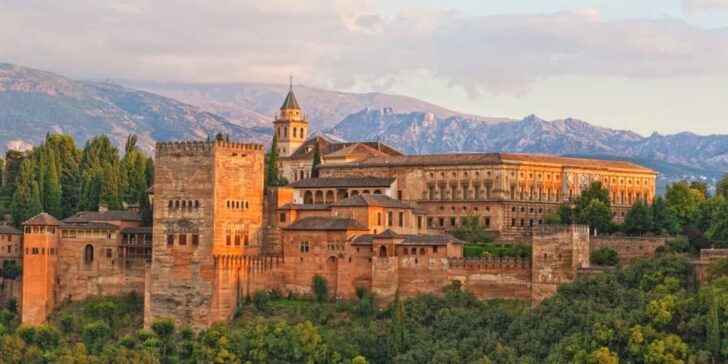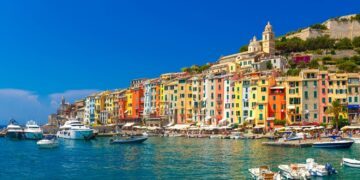Almost everyone in the world has heard of the country Spain.
Spain sits within Europe and during colonial times conquered a lot of the world.
But do you ever wonder how such a small country has influenced the world so much?
Here are 50 fantastic facts that will leave you fascinated by Spain!
Spain is 195,364 square miles (505990.437 square kilometers) which is just a little bit bigger than the state of California.
The name of Spain in Spanish is España.
It is believed that the name España, came from the word Ispania, which means rabbit. This name was given to the land in around 300 B.C by the Carthaginians.
Although you might think that Barcelona is bustling the capital of Spain, it isn’t. Madrid is the capital of Spain.
Spain is the second-largest country in the EU.
The Spanish Royal family known as The Bourbon family has been in reign since the 1700s.
Spain is considered to be an old country but it was only officially founded on December 6, 1978.
The Kingdom of Spain is its official name.
The Spanish national anthem, called Marcha Real, is 1 of only 4 in the world that has no lyrics.
Spanish is the second most popular language spoken in the world. With 5.85%, of the world’s population, around 442 million people speaking it in 2020.
The Spanish flag is yellow, with a red horizontal stripe across the bottom and top and a coat of arms on the left side of the flag.
There are no laws against nudity in public places, although it is still considered inappropriate in certain places and some areas like Barcelona have banned nudity on the streets.
In Spain, there is no tooth fairy! Instead, when they lose a tooth, they lay it under their pillow for a little mouse called Ratoncito Pérez to collect. The character originated from Madrid in 1894 and is a popular character within Hispanic culture.
The national animal of Spain is the Bull; this is to represent their love of bullfighting.
Because of animal welfare bullfighting is banned in most countries but it is still LEGAL in most parts of Spain.
La Plaza de Toros de Las Ventas del Espíritu Santo, also known as La Ventas for short, was the main arena in Madrid used for bullfighting. But it is now a museum and used to hold concerts.
La Ventas in Madrid is the 3rd largest bullfighting ring in the world, with the largest being in Mexico City, Mexico, and second-largest in Venezuela.
Another bull-related sport is called “the running of the bull”. This happens once a year in most towns across Spain, and it involves letting loose between 6 to 10 cattle or bulls in a course, created by sectioned-off streets.
Paella originated from Valencia in Spain and was originally made with rabbits, snails, and vegetables.
There are many national dishes, but the best know is the Spanish omelet or Tortilla España in Spanish.
A national desert of Spain is Spanish Flan and it was first created in 1518.
Spain produces almost half of the world’s olive oil as there are over 250 million olive trees grown across the country.
Mount Teide is the highest Spanish mountain sitting at 12,198 feet (3,718 meters). It is located on the island of Tenerife, Canary Islands.
The highest mountain in mainland Spain is located in the southeast of the country and is called Mulhacén. It can be found in the Sierra Nevada mountain range and is 11,413 feet (3,478 meters) tall.
The longest river on the Iberian Peninsula starts in Spain. It is called the river Tagus and is 626 miles (1,007 kilometers) long. 445 miles (716 kilometers) of it run through Spain and then along the border into Portugal.
The national flower of Spain is the Red Carnation, known as Clavel in Spanish and it is grown in the south of Spain in Andalusia and Aragon.
There are an impressive 47 locations that are listed as UNESCO world heritage sites in Spain.
The oldest official restaurant in the world according to the Guinness Book of Records is in Madrid. It has been running since 1725 and is called Sobrino de Botín.
The oldest building that can be found in Spain is the Santa María del Naranco Palace, Church of Saint Mary in English, which was built in 848.
Every year there is a festival called La Tomatina. It is the festival of tomatoes and the streets turn into one massive food fight with tomatoes.
On the Spanish island of Lanzarote, there is a restaurant called El Diablo in the Timanfaya National Park that uses the volcano itself to grill the food. There is a specially built grill over one of the volcano holes.
The first type of Quill pen to be used was in Seville, Spain from around 600-1800 AD.
In 1535 Guglielmo de Lorena invented the first-ever diving bell, which would lead to considerable advancements of the diving world.
Spain has produced some of the most famous artists in the world, from Pablo Picasso to Salvador Dalí.
The first-ever modern novel called “Don Quixote” was written by Spanish writer Miguel de Cervantes. The first part of the novel was published in 1605.
Arnold of Villanova, born in Spain around 1240, was the first person to discover carbon monoxide.
A Spanish engineer called Manuel Jalón Corominas invented the first mop and bucket in 1956.
Spain is home to the only monkeys in Europe. The Barbary macaques can be found in Gibraltar, which although is a British overseas territory, is located on the southern tip of Spain.
Between the mainland of Spain and the Spanish Islands, there are up to 9,000 species of vascular plants, making it the country with the largest diversity in Europe.
Only 25% of the plant species found in Spain are native.
Spain is home to many native animals, such as the Iberian Lynx, Iberian Wolf, The Spanish Ibex, and the Iberian Pig.
The Iberian Pig is most well-known for its meat. It is used to make Serrano ham and the best Serrano ham comes from the pigs that are fed only a diet of acorns.
In 1990 the Consorcio del Jamón SerranoEspañol, the Spanish Serrano Ham Consortium in English, was formed. The aim was to bring together exporters and producers of Serrano ham to ensure that only the highest quality of Spanish Serrano ham was produced.
Tapas; the concept of small dishes of food to accompany alcohol was invented in Spain.
The legend is that when King Alfonso X became severely sick, he could only digest small amounts of food alongside a glass of wine. After his recovery, he issued a statement that from then on, all Inns could only serve wine with food.
Chorizo is originally from Spain, not Mexico.
There is a word in Spanish that categorizes all Iberian cured and aged meat and it is “Embutido”.
Flamenco dancing is an art form that was born in Andalucía, Spain in the 18th Century.
There are three elements that make Flamenco an art and these are; song, which is “cante” in Spanish, dance “baile” and guitar playing which is “guitarra” in Spanish.
The first brick of La Basillica de La Sagrada Familia, known in English as the basilica of the holy family was laid in 1882. It is still in construction (2020), meaning it holds the title of being the longest building to construct.
And there you have it – 50 fantastic facts about sunny Spain.
I don’t know about you, but I’m already packing my suitcase!
From the fascinating flamenco dancing to the flan desserts, here I come.


















